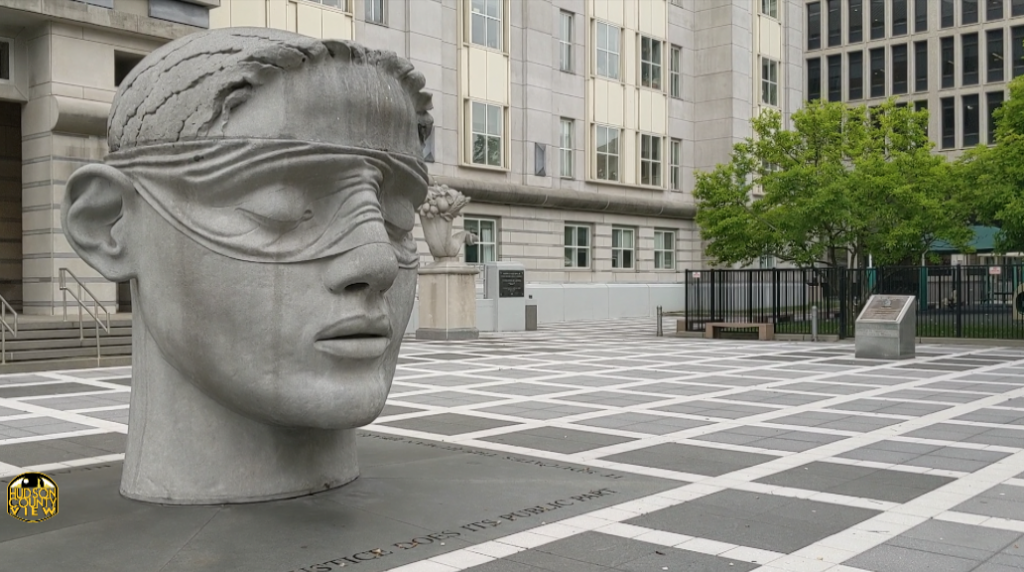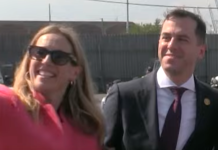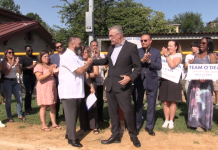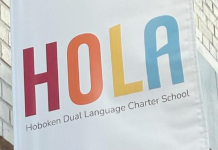Closing arguments were given this morning in the federal vote-by-mail fraud trial of Frank Raia pertaining to the 2013 Hoboken municipal elections, leaving his fate in the hands of a jury after four days of testimony.
 By John Heinis/Hudson County View
By John Heinis/Hudson County View
“It’s your job to decided whether you believe Matt Calicchio, whether you believe Michael Holmes, whether you believe Freddie Frazier,” stated Assistant U.S. Attorney Rahul Agarwal, noting that all three witnesses, defined as “captains” in Raia’s 2013 council-at-large campaign, have signed cooperation agreements.
“As you judge their credibility and whether or not they’re being truthful: their testimony matches up. They compliment each other on the major points … they corroborate each other. They’re telling you what they saw and they all generally saw the same thing.”
To that end, Agarwal indicated that witnesses consistently testified that Raia ran an operation out of his social club, located at 526 Jefferson St., back in 2013, where he also sought to pass a referendum that would loosen local rent control laws.
Calicchio, Holmes and Frazier testified that they were told to offer low-income Hoboken residents $50 in exchange for their vote at the direction of Raia, who allegedly routinely reviewed open ballots at the club to see who they voted for – which is illegal.
Agarwal also honed in on declarations voters signed claiming that they worked for the “Let the People Decide” super PAC, a political entity that hopes the rent control ballot question would pass (it did not), noting that testimony showed this was clearly a sham.
“That’s exactly what it was [a cover story] because the defendant needed a piece of paper to say they were doing things the right way. But what you know is that was all a sham, it was a cover,” he exclaimed.
Gloria Diaz, a non-English speaking Hobokenite who voted-by-mail in 2013, was called the “most stark example” of how this alleged vote-by-mail operation worked, given that she signed a VBM ballot in English, testifying she didn’t even know who or what she had voted for.
Finally, Raia’s own testimony was picked apart, noting that he said on direct testimony he was the one who hired Bluewater Operations, but on cross examination he said it was Tim Occhipinti – the mayoral candidate on top of Raia’s “One Hoboken” ticket six years ago.
Agarwal further highlighted that Raia stated he didn’t listen to the testimony of his former friends, putting forth specific reasons that showed some obvious animus over politics.
“I don’t listen to him, he works for Beth Mason,” Raia said of Calicchio.
“When Mr. Holmes choses Mr. Russo, a councilman in Hoboken, over me, I don’t listen,” he stated regarding Holmes’ testimony.
When concluding, Agarwal said the evidence is clear that Raia tried to rig the 2013 elections, even if both his council bid and referendum push came up short.
“Ladies and gentlemen you’re familiar with the concept of one person, one vote. With this scheme, the defendant managed to vote for himself many times. It doesn’t matter, in this case, or ever, but certainly here, it doesn’t matter: your political party, your ideology, where you work, where you grew up,” he stated.
“What you know is this was illegal. The only verdict that is consistent, with the testimony of Calicchio, Holmes, Frazier and those voters, ladies and gentlemen: I ask you to return a verdict of guilty.”
Alan Zegas, Raia’s defense attorney, followed up by targeting the credibility of the witnesses, noting that Calicchio, Holmes and Frazier had all given testimony in the past week that has been inconsistent with either FBI interviews and/or grand jury testimony.
“All of these witnesses were approached by the FBI by surprise. The government wants you to believe that when surprised, not suspecting the questions, they lied. Yet after being charged or being given non-prosecution agreements suddenly start telling the truth,” he rationalized.
The aforementioned trio had all signed cooperation agreements with the government, which Zegas said clearly incentivized them to tell the government what they wanted to hear.
In regards to Let the People Decide and Bluewater, Zegas said that residents routinely signed declarations that they would work, that it wasn’t up to Raia to determine they all performed campaign activities and that if Bluewater was really hired to circumvent campaign finance rules, cash would have been used instead of checks.
He furthered his argument by point out that Andrew Canonico, the treasurer of Let the People Decide, testified “only voters got checks.”
He said something similar, yet more definitive, when addressing Frazier.
“His testimony is consistent from beginning to end: voters had to work in order to be paid,” Zegas said.
Additionally, Zegas reminded the jury that character witnesses such as Rev. Alexander Santora, the pastor at Our Lady of Grace church, testified that Raia donated $5,000 over three years so the church could throw an annual event – despite never being a member of the parish.
“Mr. Raia is presumed to be innocent and the government has to prove its case beyond a reasonable,” Zegas indicated.
“The testimony of three witnesses in particular, Calicchio, Holmes and Frazier, had to give testimony that pleases the government … The government clearly has not proven its case beyond a reasonable doubt.”
On rebuttal, Assistant U.S. Attorney Sean Farrell said that it would be nearly impossible to believe Raia’s scenario that his campaign loyalists acted on their own, given that Calicchio, Holmes and Frazier were all on the same page when it came to the most important details.
“The central points and allegations in this case were perfectly consistent … These workers, unlike the defendant, had no skin in the game. In fact, Calicchio and Frazier told you they were dead set against the referendum. They weren’t even paid to work.”
While Farrell acknowledged that Raia had participated in a number of charitable acts throughout the course of his life, that had nothing to do with a jury being convened for this trial.
“It’s not about philanthropy, it’s not about charity … it’s about the defendant using his money to buy an election through bribery,” Farrell asserted.
“He wanted to win a city council seat, he wanted to pass a referendum … rather than let the people of Hoboken decide, Frank Raia wanted to decide for them. After reviewing the evidence, the court’s instruction, you will come back with the only reasonable verdict in this case: guilty.”
U.S. District Court Judge William J. Martini finished charging the jury at 12:42 p.m., leaving them at least until 4 p.m. to deliberate.









This is what will take down Ruben too. He also pays people to vote with a cover story that the paid voter is a “GOTV worker”:
“That’s exactly what it was [a cover story] because the defendant needed a piece of paper to say they were doing things the right way. But what you know is that was all a sham, it was a cover,†he exclaimed.”
Defame, Libel or Slander much?
Lawyer UP!
Kidding of course. When you throw slander out there against the written word, it’s the dictionary you need to study. Later, you can brush up on the law where you’ll find that the bar for defaming Ramos is far above anything implied here, particularly in New Jersey.
And when you’re done with all that, you still have the reasonable suspicion that someone who piles up the VBM’s in the 4th ward like Ramos is just playing the same game as Raia and Yacco, but with different “assistance.â€
So take a breath, Me Wannabe Attorney.
What about Ravi’s running mate Michael Russo? He’s paid more Election day workers than anyone and he’s picking Ravi’s council slate
She doesn’t want to go there. That’s not beneficial to Russo ally Ravi Bhalla.
https://youtu.be/LGvE8kXz8Mg
Word is the Raia portraits around town and on buildings have been ordered to be removed upon the verdict.